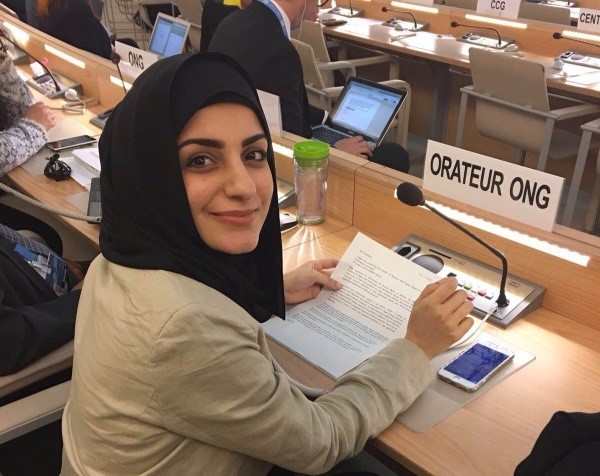On 16 November 2016, the Government of Bahrain sent masked civilian police and riot police to surround the house of Asma Darwish’s family in Sitra, Bahrain. Authorities sent the police to Darwish’s house to summon her to Bahrain’s Public Prosecution Office (PPO) the next day for charges of “illegal gathering” she allegedly participated in three months prior. The catch is that Darwish currently lives in France, and she has been exiled there with her family for more than one year.
Darwish currently works for the Bahrain Center for Human Rights (BCHR), where she advocates on behalf of people whose rights the Bahraini government have violated. Darwish previously lived in Bahrain. However due to her participation in the 2011 pro-democracy movement and human rights advocacy since then, she has been exiled and now lives in France with her husband, Hussain Jawad. Jawad also works to promote human rights in Bahrain, and is the co-founder and chairman of the European-Bahraini Organization for Human Rights (EBOHR). In February 2015, Bahraini authorities arrested Jawad and subjected him to torture and ill-treatment for “inciting hatred.”
The Bahraini authorities have summoned a number of human rights activists and civil society members recently. Darwish is one of several BCHR members who authorities summoned. Others include Nedal al-Salman, Enas Oun, and Ahmed al-Saffar, who were all accused of “illegal assembly.” Additionally, authorities charged BCHR’s Hussain Radhi with “inciting hatred against the regime and spreading false news” for tweets and retweets he made. The president of BCHR, Nabeel Rajab, is currently in prison awaiting his next trial date. Police arrested Rajab on 13 June 2016 and have since charged him for tweets. He could face up to 15 years in prison for peacefully expressing his opinion on social media.
In addition to the members of BCHR, authorities have targeted other civil society activists. On 10 November, investigators at the PPO interrogated human rights lawyer Mohammed al-Tajer. Officials subsequently charged al-Tajer with “insulting a sect” under Article 172 of the Penal Code, “misuse of telephone” under Article 290 of the Penal Code, and “insulting a statutory body” under Article 216 of the Penal Code. Additionally, forces also interrogated medic Ebrahim Demistani over charges of “illegal assembly,” and member of Bahrain Society for Human Rights Zeinab al-Khamis for “illegal assembly.” Authorities have subjected all of the above-mentioned individuals, in addition to the others who were summoned, to travel ban. Sources believe the Bahraini government may have initiated this string of recent interrogations in order to justify the arbitrary implementation of the travel bans.
As Darwish noted on the day police surrounded her family’s house in Bahrain, the recent summons are “bizarre.” The increased harassment of human rights activists comes as part of the Bahraini government’s particularly harsh repression of civil society in the past year. “[This is] a clear and obvious indication that charges brought against human rights defenders nowadays [are] baseless and untrue,” said Darwish. Baseless, indeed, when authorities begin attempting to target those they seem to have forgotten they already exiled.
Erin Sigmon is an Advocacy Associate for ADHRB.





